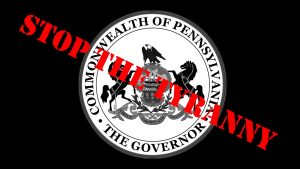(W ashington, D.C. – December 7, 2023) Today, the American Freedom Law Center filed a petition for a writ of certiorari in the U.S. Supreme Court, asking the court to review a decision by the U.S. Court of Appeals for the Third Circuit, dismissing AFLC’s challenge to Pennsylvania’s COVID-19 restrictions.
ashington, D.C. – December 7, 2023) Today, the American Freedom Law Center filed a petition for a writ of certiorari in the U.S. Supreme Court, asking the court to review a decision by the U.S. Court of Appeals for the Third Circuit, dismissing AFLC’s challenge to Pennsylvania’s COVID-19 restrictions.
The lawsuit was filed on September 3, 2020, in the U.S. District Court for the Middle District of Pennsylvania on behalf of four citizens who object to the Orwellian contact tracing program and mandate to wear masks, claiming that these restrictions violate fundamental constitutional rights.
The lawsuit was filed against the Pennsylvania Governor, the Pennsylvania Attorney General, and the Secretary of Health for the Pennsylvania Department of Health.
After denying a request for a preliminary injunction, the district court dismissed the lawsuit, claiming that the plaintiffs lacked standing to challenge the contact tracing program (even though they were subject to its restrictions and harmed by them) and that their challenge to the mask mandate was moot as the Department of Health unilaterally rescinded the mandate in June 2021, which was eight months after the lawsuit was filed.
The challengers appealed to the Third Circuit, and the circuit court affirmed, dismissing the lawsuit on standing and mootness grounds.
As stated in the petition filed today in the Supreme Court:
The COVID-19 pandemic created a constitutional crisis. For years, American citizens, including Petitioners, were subject to constantly changing orders that imposed burdens on fundamental freedoms in a way that our nation has never experienced in its history. The cost of these burdens is incalculable. Unfortunately, many courts did nothing, abdicating their duty to say what the law is and allowing this assault on liberty to proceed largely unchecked.
* * *
“Determination by the [government] of what constitutes proper exercise of police power is not final or conclusive but is subject to supervision by the courts.” Meyer v. Neb., 262 U.S. 390, 400 (1923). But this supervision is only effective if the courts are willing to exercise their authority to decide important constitutional questions. Unfortunately, the Courts’ justiciability doctrines (standing, ripeness, mootness) have become convenient excuses for lower courts to surrender their duty to say what the law is, particularly when dealing with the draconian and historic restrictions imposed during the recent pandemic.
While the fear engendered by war, pandemic, or some other crisis might lead politicians, their attorneys, and yes, even judges of the highest order, to assert that patent violations of the Constitution are acceptable (or beyond judicial scrutiny) because public safety interests demand an exception to our most fundamental liberties, history teaches that we will look back on these arguments as “gravely wrong . . . overruled in the court of history . . . and . . . [having] no place in law under the Constitution.” Trump v. Haw., 138 S. Ct. 2392, 2423 (2018) (repudiating Korematsu v. United States, 323 U.S. 214 (1944)).
During times such as these, “[i]t is emphatically the province and duty of the judicial department to say what the law is.” Marbury v. Madison, 5 U.S. (1 Cranch) 137, 177 (1803). The importance of doing so during (and in the immediate aftermath of) a crisis is essential to ensure the protection of constitutional liberties for it is in such times that the need for protection is at its zenith. See generally Coolidge v. N.H., 403 U.S. 443, 455 (1971) (“In times of unrest, whether caused by crime or racial conflict or fear of internal subversion, this basic law [the Fourth Amendment] and the values that it represents may appear unrealistic or ‘extravagant’ to some. But the values were those of the authors of our fundamental constitutional concepts.”).
The petition asks the high court to reverse the Third Circuit and remand the case for a determination on the merits of the important constitutional claims.
